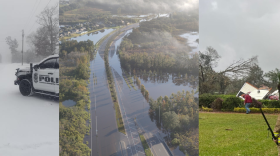MARY LOUISE KELLY, HOST:
It's been a week since a student movement in Bangladesh toppled that country's leader, the autocratic Prime Minister Sheikh Hasina. This is the sound of protesters overrunning her residence. It seems, though, that life has already largely returned to normal, at least in the capital, Dhaka. Our correspondent Diaa Hadid is there right now to give us a sense of what the country looks like a week after the prime minister fled on a military helicopter. Hey there, Diaa.
DIAA HADID, BYLINE: Hello.
KELLY: Hi. So I have been so curious what life there looks and feels like. I know you've been on the streets. Tell me what you're seeing.
HADID: Well, Dhaka's famous gridlock is back but with a twist. This is a city of Gen Z, the teenagers and young adults who overthrew the former prime minister. And now, they're on every street corner, directing traffic in a city of more than 10 million people. And these are girl scouts with braids, teenagers with pimples, lots of young men, women in headscarves, and they've got whistles, sticks, stop-go signs, and motorists obey them.
At one large intersection, it was like they were conducting this chaotic ballet when they had to stop traffic on all sides for an ambulance to punch through. Have a listen.
(SOUNDBITE OF AMBULANCE SIREN)
HADID: It was nuts. They're on the streets because the police melted away after Sheikh Hasina fled the country. The police were blamed for the violent crackdown on protesters that killed more than 300 people. And these police are filtering back now, but they're vastly outnumbered by students on the streets. And these students are also all over painting revolutionary murals like Mumtahana Munir Mitti. She's 19 and studies engineering. And she says her generation was long dismissed.
MUMTAHANA MUNIR MITTI: We youth are not only the generation of Facebook, YouTube and Instagram. We also love our country. And we also love to participate in rebuilding of our country.
KELLY: Love to participate in rebuilding. I mean, she sounds joyful, Diaa. I'm imagining, though, there must also be fear, anxiety, so much change happening at once. What are people telling you?
HADID: Yeah. Of course, people are worried about their safety. There's no police out there. But it's a particularly lively concern for Hindus. They number about 13 million people in a country that's overwhelmingly Muslim. And we were out in a Hindu-dominated quarter today. It's famous for its gold jewelry market. But many Hindu sellers haven't put out their jewelry displays. They're afraid. They say they're particularly vulnerable because they're seen as sympathetic to the former prime minister, Sheikh Hasina. She's a woman who's openly despised, and yet many Hindus I spoke to said they felt protected under her rule. And they're not sure if the next government will be as sympathetic to them.
KELLY: Well, and before we get to the next government, just who is running things now? There's an interim government?
HADID: Yes. The interim government is led by the Nobel Laureate Muhammad Yunus. He's widely respected by Bangladeshis, which is good because he's got a giant job. He and his government have to rebuild the police. They've got to undertake deep legal reforms. They've got to prepare for the next elections. They've also got to keep the lights on, the trains running. There's a lot of moving parts. And analysts and diplomats I've spoken to are nervous that the team around Yunus doesn't have the policy experience or political chops to navigate all of this.
KELLY: Well, and one more thing I was wondering about, which is the economy. How is the economy doing with all this upheaval?
HADID: Right. Well, the thing is there's a lot of expectations out here because the economy here was battered because of COVID and rising inflation. And so today we were speaking to a rickshaw cyclist, and he told us his daughter's stuck at home because he can't afford to send her off to college. He can't afford to marry her off either. His son is 16, not in school, unemployed. He says his family's stuck. He wants the government to make food cheaper and create jobs, and that's echoed all across the city. It's hard to imagine how one interim government can pull all this off. And so Bangladeshis right now are waiting, but for how long?
KELLY: NPR's Diaa Hadid bringing us the sounds and sights from Dhaka in Bangladesh. Thank you, Diaa.
HADID: Thank you, Mary Louise. Transcript provided by NPR, Copyright NPR.
NPR transcripts are created on a rush deadline by an NPR contractor. This text may not be in its final form and may be updated or revised in the future. Accuracy and availability may vary. The authoritative record of NPR’s programming is the audio record.








